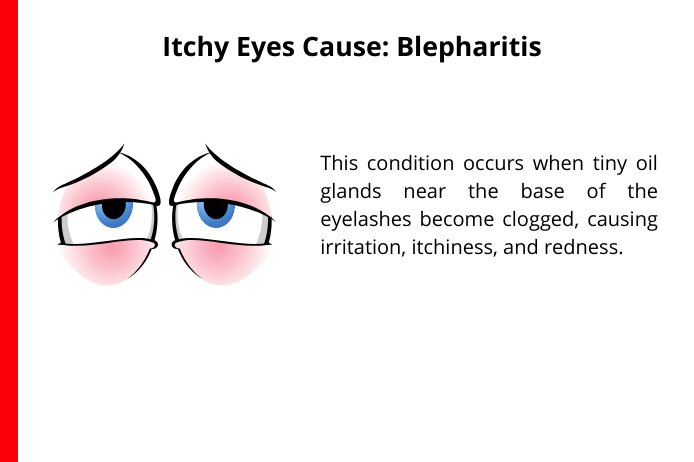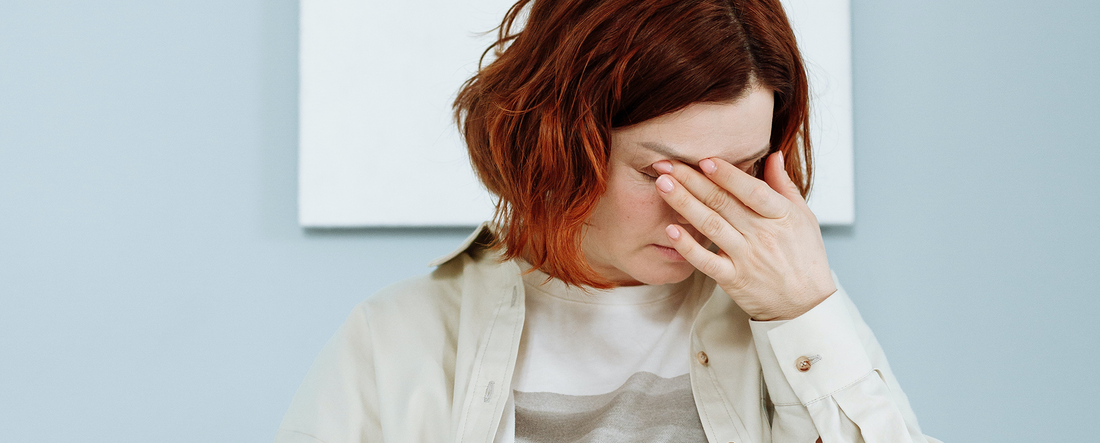Having itchy eyes can be very uncomfortable. On top of that, you really can’t scratch the itch due to the risk of further irritation, spreading germs, or even damaging your delicate eyeball. There are several things that can cause itchy eyes and discovering the root of the problem is key for finding relief. In this article, we’ll discuss the most common causes of itchy eyes, as well as solutions to help you tame the symptoms.
Allergies
The most common cause of itchy eyes is allergies, which can be either seasonal or perennial (year-round). Seasonal allergies, which are most common in the spring and fall, are caused by high pollen counts and exposure to outdoor allergens like grass and weeds. Perennial allergies, on the other hand, are present all year and are caused by things like mold, dust, or pet dander. People can also be sensitive to airborne irritants such as smoke, diesel exhaust, personal care products, makeup, and perfumes.
Regardless of the type of allergy you’re experiencing, symptoms are generally the same and include itchiness, burning, clear discharge, and redness.
To calm the allergic response and ease itching, you can:
- Avoid triggers, if possible (i.e. avoiding cats, frequently dusting your house, etc.).
- Take over-the-counter antihistamines.
- Use allergy eye drops.

Dry eye
Dry eye is a very common problem that occurs when your eyes don’t make enough tears to lubricate and nourish the eye. Many things can cause dry eye, including but not limited to, aging, certain medications, too much screen time, weather, hormonal changes, and certain health conditions such as rheumatoid arthritis, Sjogren’s syndrome, thyroid disease, and lupus.
In addition to itchiness and a feeling of dryness in your eyes, symptoms of this condition can include blurry vision, feeling as if you have something in your eye, difficulty wearing contact lenses, and redness.
The treatment for dry eye will depend on the specific cause, but generally speaking, things that may help include:
- Using eye drops throughout the day (either over-the-counter or prescription).
- Using artificial tear ointment or thick eye drops right before you go to bed.
- Limiting screen time or taking breaks while using digital screens.
- Wearing blue light blocking glasses while using your iPhone, iPad, or computer to filter out the blue-violet rays that are emitted from digital screens.
- Adding omega-3 fatty acids to your diet, which are naturally found in oily fish such as salmon, sardines, trout, flaxseeds, chia seeds, and hemp seeds.

Contact lenses
While contact lenses are a blessing for those with blurry vision, they can sometimes cause itchiness and other symptoms for a variety of reasons. Keeping your contact lenses in for too long, not cleaning them properly, or failing to replace them regularly can irritate your eyes, causing them to become itchy and red.
Some people can also develop an allergy to their contact lenses or their contact lens solution. This condition, called giant papillary conjunctivitis, causes bumps under the eyelid, swelling, itchiness, redness, and sensitivity.
To reduce the risk of these issues, it’s crucial to take your contacts out at night, clean them well, and replace them according to the manufacturer’s guidelines. If basic care isn’t helping, visit your eye doctor to discuss treatment options.

Blepharitis
Blepharitis is inflammation of the eyelids that usually affects both eyes along the edges of the eyelids. This condition occurs when tiny oil glands near the base of the eyelashes become clogged, causing irritation, itchiness, and redness. Other symptoms include watery eyes, eyelids that appear greasy, swollen eyelids, flaking of the skin around the eyes, crusted eyelashes, feeling like something is in your eye, and blurred vision.
Most of the time, blepharitis happens because you have too much bacteria on your eyelids at the base of your eyelashes. Sometimes simply cleaning your eyelids with a gentle, diluted cleanser like baby shampoo is enough to resolve the issue. Other times, the condition becomes chronic and may require prescription eye drops, anti-inflammatory medications, and/or antibiotics to find relief.

Eye strain
Eye strain occurs when your eyes get tired from extensive use, such as working on a computer for a long period of time, trying to read in a poorly-lit area, driving on a long trip, or trying to stay awake when you’re tired. Fatigued, strained eyes can start to feel itchy, irritated, and dry and appear red.
Here are some tips for preventing and resolving eye strain:
- Use the 20-20-20 rule when using digital devices: Look at something about 20 feet away for 20 seconds every 20 minutes of digital device use.
- Wear blue light blocking glasses when using digital devices to filter out the blue-violet rays that are emitted from digital screens which can increase eye strain.
- Pull over and rest your eyes on long drives.
- Make sure you have adequate light when reading.
- If you’re too tired to keep your eyes open, it’s time to sleep! Forcing yourself to stay awake is not only bad for your eyes, but dangerous, too.

Infection
If an infection is the cause of your itchiness, it will likely only affect one eye, although it may spread to the other eye. The most common infection is conjunctivitis, or pink eye, which causes your eye to appear pinkish-red. Other symptoms include itchiness, increased tear production, a goopy discharge, crusting of the eyelids or lashes, and feeling like something is in your eye.
The infection may be caused by bacteria or a virus, both of which tend to get better on their own. You can typically manage symptoms by applying a warm compress a few times a day. It’s important to note that pink eye is highly contagious so avoid touching your eyes and sharing towels and pillowcases with others. In some cases, antibiotics may be needed to help clear the infection.

The bottom line
As you can see, there are many causes of itchy eyes and the treatment depends on the source of the itch. If your itchy eyes don’t feel better after a few days of home care, it’s a good idea to visit an eye doctor who can help diagnose and treat the issue. Whether your symptoms are caused by allergies, dry eye, eye strain, or anything in between, there are solutions that will help soothe your eyes and put an end to the itchiness.





 UK site
UK site EU site
EU site US site
US site Canada site
Canada site